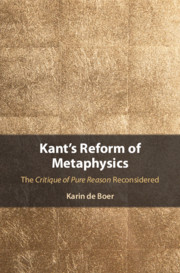Book contents
- Kant’s Reform of Metaphysics
- Kant’s Reform of Metaphysics
- Copyright page
- Contents
- Acknowledgments
- Abbreviations
- Introduction
- Chapter 1 Wolff, Crusius, and Kant
- Chapter 2 The “Thorny Paths of Critique”
- Chapter 3 Ontology, Metaphysics, and Transcendental Philosophy
- Chapter 4 Things in Themselves, Transcendental Objects, and Monads
- Chapter 5 The 1781 Transcendental Deduction of the Pure Concepts of the Understanding
- Chapter 6 The Schematism of the Pure Understanding
- Chapter 7 Transcendental Reflection
- Chapter 8 Kant’s Projected System of Pure Reason
- Conclusion
- Bibliography
- Index of Names
- Index of Subjects
Conclusion
Published online by Cambridge University Press: 20 August 2020
- Kant’s Reform of Metaphysics
- Kant’s Reform of Metaphysics
- Copyright page
- Contents
- Acknowledgments
- Abbreviations
- Introduction
- Chapter 1 Wolff, Crusius, and Kant
- Chapter 2 The “Thorny Paths of Critique”
- Chapter 3 Ontology, Metaphysics, and Transcendental Philosophy
- Chapter 4 Things in Themselves, Transcendental Objects, and Monads
- Chapter 5 The 1781 Transcendental Deduction of the Pure Concepts of the Understanding
- Chapter 6 The Schematism of the Pure Understanding
- Chapter 7 Transcendental Reflection
- Chapter 8 Kant’s Projected System of Pure Reason
- Conclusion
- Bibliography
- Index of Names
- Index of Subjects
Summary
Kant’s critical philosophy is reputed to impose strict limits on the cognitive activities carried out by the human mind. The mind is said to be able to generate empirical knowledge by means of two forms of intuition and twelve categories, and to delude itself whenever it illicitly ventures beyond these limits in search of a priori knowledge of the soul, the world as such, and God. Even if Kant may have been unable to demonstrate all of the claims he advances in the Critique of Pure Reason, we can be satisfied with the epistemological modesty his work proclaims: it allows us to pit Kant’s work against the extravagancies of philosophers such as Fichte and Hegel as well as to follow his beacon in our own even more modest pursuits.
- Type
- Chapter
- Information
- Kant's Reform of MetaphysicsThe <I>Critique of Pure Reason</I> Reconsidered, pp. 255 - 259Publisher: Cambridge University PressPrint publication year: 2020

